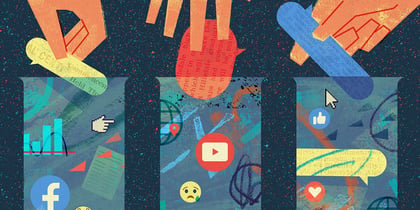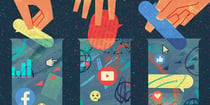Is the problem the technology or the human? - Issue #344

A few weeks ago, I read two wildly dissimilar books. Irresistible by Adam Alter, was one of those books that said it all in the subtitle, "The Rise of Addictive Technology and the Business of Keeping Us Hooked." Makoto Fujimura's refractions was far more difficult to discern, but a deeper work about the power of human creativity in our technopolistic age.
I've been largely convinced that my pet rectangle isn't too good for me. Nor is endless social media and doom-scrolling. Putting my phone down is almost always a good move. But I'm not convinced that this talk of behavioral addiction is anything more than a pseudoscience. Alter's is the sort of book that's full of those "unable to replicate" psychology studies and makes much of scary quotes from the "dissenters of big tech." Reality isn't so clean. Sure, as the horrible stories in the book confirm, some of us can't stop and waste our lives by video-game playing or otherwise frittering away our time. But a whole lot of us get a whole lot of utility from our technology.
The connection between these books is whether we choose to make the person or the technology the centerpiece of our world. Our tech-centric moment needs an immoderate dose of humanism. Our problems aren't technology problems, they're human problems. The solutions won't be technological. Has it helped anyone that our phones now tells us how long we've used them?
Fujimura's books, and now I've read more than a few of them, ask us to consider being creators or artists. Rather than moving quickly and usefully through our technology-enabled lives, he thinks we ought to slow down, consider more, and create something real. Through my reading of Art + Faith, I was thinking about my little bonsai tree hobby.
My little trees are tech-enabled, sure. Watching YouTube videos has helped me understand how to practice the art. But there's nothing fast or slick or tech about trying to grow trees in this specific, thousand year-old way. And that's what makes it a tonic; that's why I'm not posting about it on social media.
-----
For the reading week, I have a subscriber submission! My friend Mark suggested this piece would fit into this email's oeuvre and I think he's absolutely right. While I liked the narrative and enjoyed reading a history of the recent internet, I'm not so sure I agree with the author's position that it's the technology that changed. (Besides, any description of the early 2000s era of blogging as halcyon days is nostalgic hagiography. The internet has always been a pit.) It wasn't the tech, I think it was us. We asked for an trained and used the algorithms. We moved from text to image and video and instant reaction. That's heartening, though, because if it's our fault, then we can fix it.
Reading
|
|
|
